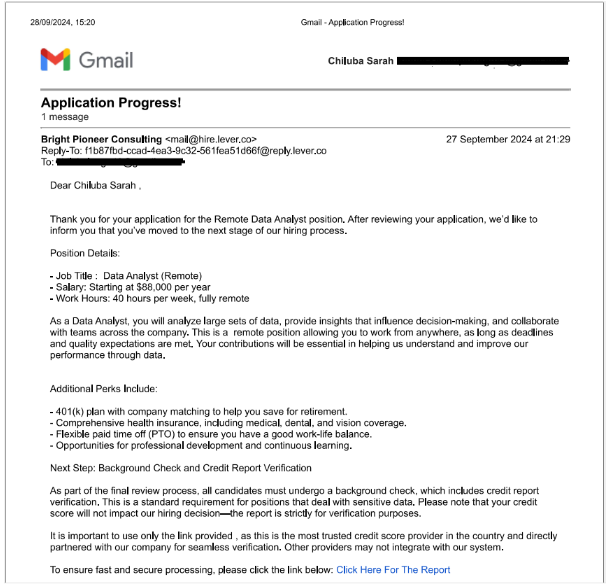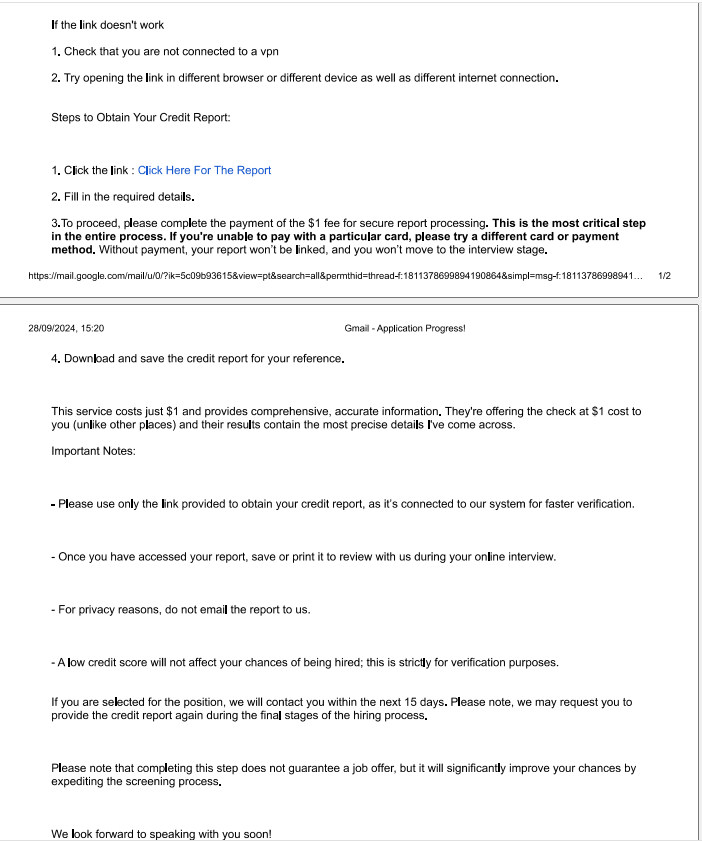Spot the Scam: Your Essential Guide to Identifying Fake Emails and Protecting Your Wallet!
Are you fed up with falling for scam emails and then parting with money to the fraudsters? This step-by-step guide will show you just how to identify fake emails before they start wreaking havoc on your finances. You will be given actionable tips on decoding phishing attempts, from recognizing red flags to safeguarding your personal information and savings. Keep one step ahead of scammers and keep your hard-earned cash.Blog post description.
9/28/20246 min read


Save Your Money by Identifying Scam Emails: A Step-by-Step Process
Introduction
Or, have you ever received an email offering a dream job with huge sums of money promised, and felt that gnawing doubt? We've all been there. Scammers know how to use that excitement and urgency to their benefit, becoming increasingly sophisticated day by day. It may look very professional with email templates or some very catchy job titles, but with one wrong click, it could cost you more than you would have thought of.
How to identify scam emails, more importantly, how knowing the signs can save you serious money. We are going to break down common signs that an email is a scam, teach you how to protect your financial well-being, and provide you with some tools to set you on your path to better navigate these traps. And if you're wondering whether this applies to your daily life, well, yes, it does. That fishy email promising that remote job? We'll unpack it as a real-world example to get you started.
By the end of this guide, not only will you have an unforgivingly keen eye for scams, but you'll actually be well down the road to saving money by avoiding some really costly mistakes.
Now, let's dive into how to spot scams and save money!
The Anatomy of a Scam Email
Knowing what an e-mail scam looks and feels like is the first step in protecting your money from the scammers. The scams have moved from the "Nigerian prince" scheme to some really sophisticated means that can easily hoodwink even the most savvy online users. They masquerade the emails as job offers, subscription renewals, or urgent bank notices.
Let me just walk you through this scam email I got yesterday from "Bright Pioneer Consulting." If you just glance through, everything seems perfect, right? Great salary, remote work flexibility-just about everything one could ask for, even professional benefits like 401(k) matching. But let's deep dive a little further. The thing that caught my eye as weird in this is
The email address: The address "mail@hire.lever.co" does not sound appropriate for a company claiming to offer such a high-profile position. Reputable companies always use corporate email domains like "@company.com." One should always check the domain of the sender's e-mail address.
The offer that is too good to be true: $88,000 a year for a data analyst job that one can do from home sounds great, but remember, if it feels too good to be true, then it probably is. Victims fall into scammers' traps when these people dangle things that are hard to resist.
Payment requests: They ask you to pay $1 to get your credit report. No legitimate employer is going to ask for one form of payment or another during a recruitment process. Major warning sign here.
Urgency and pressure: The email works on that sense of urgency with multiple reminders to "click the link" and "complete this process quickly." Scammers operate just fine by pushing people to act before they think.
With all these key components analyzed, you will be spotting red flags easily. Knowing the signs is basically one of the biggest ways to save yourself from falling into the trap and taking care of your hard-earned money.
Protecting Yourself: Practical Ways to Stay Safe
Having looked at how to identify those scam emails, the next step is how to protect yourself and, consequently, your savings. Scammers aren't just after your credit report but are after your bank details, your identity, and your financial stability. Following is a practical measure for protection against their fraudulent activities:
Always verify the source: Before clicking on any links in that unsolicited email, take a second to investigate the source. An act as simple as checking the domain of the sender's email might give you a hint-most of the time, just looking up a company name in an internet search, or a call to the organization in question, all but confirms that their information is safe. You'd be surprised how many people fall for scams simply because they don't take this extra step.
Watch out for spelling and grammar mistakes: So many of those scam letters are full of little mistakes, from spellings to awkward phrasing. Real companies have marketing departments reviewing communications for that polished professional finish. Even subtle errors can be dead giveaways of the scam.
Never send sensitive information over mail: whether an email asks for personal information, especially sensitive information regarding credit card numbers or passwords. That is a huge red flag. No genuine company will ask for personal data over email.
Use a Password Manager: Using a password manager, not only will you store passwords in one place but also prevent phishing scams. Many password managers contain the ability to detect when you're on a fraudulent site and stop you from entering your login credentials.
Enable Two-Factor Authentication: The best second line of defense is two-factor authentication. Besides your password, it requires another form of verification-anything from a code via text message to a biometric scan-to log into one of your accounts online. Thus, even if fraudsters get hold of your password, they cannot access that account without the second step.
How Falling for Scams Hurts Your Finances
The loss of $1 may be insignificant, but being the victim of scams could lead to financial catastrophe in the long run. Let's find out exactly how being the victim of an e-mail scam can shape the future of your savings and financial security:
Identity Theft: While giving out personal information, either your Social Security number or credit card numbers, you are giving an opportunity for scammers to use that information to open accounts in your name. Once you have become a victim of identity theft, recovery can take several months or even years. Recovery might cost you thousands of dollars in attorney fees and lost wages.
Phishing for financial data: Scam emails most often link you to a fake website that captures your banking information. Once the scammer breaks into your bank account, he may transfer your savings to his account or charge credit cards to the fullest. You don't just lose money; it will also take you many hours and anxiety to recover the money.
Ruined Credit Score: Other than all the above, if a scammer gets hold of your personal details, he can open lines of credit in your name and fail to pay them off, tanking your credit score. A bad credit score might affect your future ability to get a loan, buy a house, or even get hired by some employers.
Wasted Time and Emotional Strain: Aside from the financial loss, being victimized through fraud can be overwhelmingly harassing. The tension of sorting out your financial mess, restoring your identity, or having fraudulent charges reversed may badly influence your mental health and psychological condition.
Prudent Money Moves to Avoid Being Scammed
If you are serious about saving money, it is part of your overall strategy to avoid getting scammed. Protecting yourself against these fraudulent schemes literally means you will keep more money in your pocket. Here's how you can integrate scam prevention into your money-saving habits:
Sign up for fraud alerts: Most banks and credit card companies do offer this service, wherein they will either call or email you the instance some kind of suspicious activity occurs on your account. In this way, you may take immediate remedial action in case you have fallen victim to one of these phishing frauds or otherwise.
Check your accounts on a regular basis: Make it a point in your life to check your bank statements, bills from your credit cards, and your credit report from time to time. If you see any charge or account that you do not recognize, you need to immediately contact your bank and report the problem.
Know Your Stuff and Spread the Word: Scammers don't stop thinking of ways to get your personal stuff. Educate yourself on current phishing scams, and spread the word to friends and family so that they too can be prepared. The more people who know about such schemes, the less business the scammers will have.
Keep your software updated: Scammers know it and often find ways to take advantage of you through expired versions of your software. Let your operating system, browser, and antivirus software be regularly updated to defend against vulnerabilities.
By the time you make these smart money moves, you're not only saving your money but also not spending it on fixing a problem that could have been avoided in the first place.
Stay Scam-Savvy, Save Money
In today's digital world, there is fraud everywhere, but the right knowledge keeps you away from them. Indeed, it saves your personal and financial well-being. Bear in mind that the first step to save money is a very good idea of where this money can be lost in the first place. That way, you're already ahead by staying vigilant and taking proactive steps.
Now, talking of saving, if you'd like to explore more ways to save, and if you will, then check out my Lifestyle-first savings Blueprint ebook here. It's chock-full of actionable tips that will help in taking full control over your finances and build a strong savings strategy that works for you.
Here is the scam email. Please provide your comments on this, and what you think you would have done if you were sent such an email.




Your money bff feeling lost in the world
Budgeting Tips ?
Contact:
© 2025. All rights reserved.
